|
 |
|
In the early 1900s, a new type of
entertainment in the form of moving pictures became
very popular and people greatly enjoyed a night at
the local cinema. Tipton had more cinemas than many
other towns in the Black Country, six in all: The
Alhambra, The Cinema, The Palace, The Picture House,
The Tivoli, and The Victoria. Cinemas became a
practicality after the passing of the Cinematograph
Act in 1910 that allowed permanent installations in
premises that could be inspected and licensed.
The Alhambra
Dudley Port once had its own cinema called 'The
Alhambra' that stood on the corner of Dudley Port
and Groveland Road. It occupied a building that was
known as 'The Alhambra Rink', a roller-skating rink
that had previously been a Salvation Army Citadel.
'The Alhambra' cinema opened late in 1910 or early
1911 and during the First World War was operated by
Round and Hipkins. After the war it was acquired by
fairground entrepreneur Pat Collins, who ran the
cinema until December 1927, when he sold it to Miles
Jervis Cinemas of Chasetown. They also owned cinemas
in Wednesbury, West Bromwich and Oldbury.
Around 1933, Miles Jervis sold
the cinema to Sheridan Film Services of
Burton-on-Trent, who demolished the building and
replaced it with a modern cinema. The structural
steelwork was provided by Rubery Owen of Darlaston,
and the bricks came from Pratts brickworks at
Oldbury. The interior was tastefully decorated with
murals on the side walls, depicting mountain scenes,
silk rose pink curtains, and accommodation for 830
people, in plush tip-up seats. The cinema was
officially opened on Monday the 8th April, 1935, by
Councillor A. F. Welch, Chairman of Tipton Urban
District Council. The first film was 'Sing As We Go'
starring Gracie Fields.
|
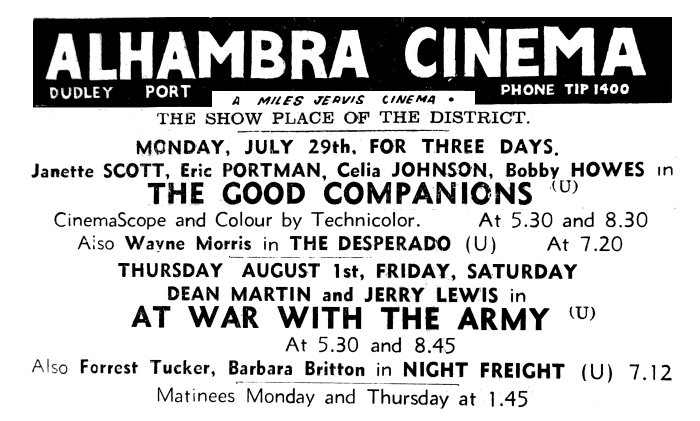
From the Tipton
Herald newspaper, July 1957. |
|
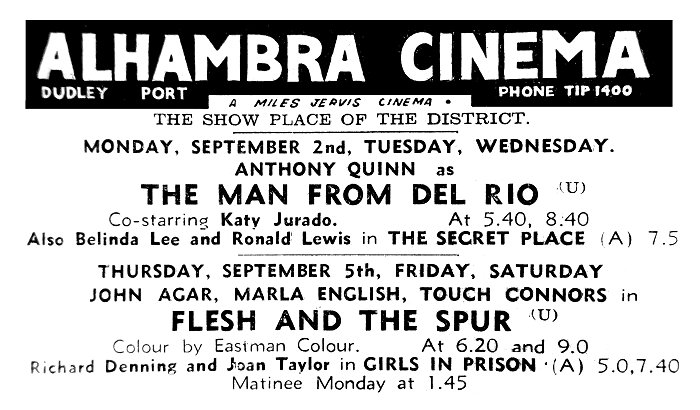
From the Tipton
Herald newspaper, September 1957. |
Although 'The Alhambra' in its
rebuilt form was Tipton's finest cinema, it stood in
a poor location and so attendances were worse than
expected. In the 1960s, Bingo sessions were held in
the cinema, run by the Midland Cinema Bingo Club.
'The Alhambra' became Tipton’s last surviving cinema
when 'The Bruce' in New Hall Street, closed in 1962.
Sadly 'The Alhambra' closed on the 3rd August, 1963
due to declining audiences. The last film was
'Sparrows Can't Sing' starring James Booth and
Barbara Windsor.
The Cinema
There was once a cinema in High
Street, on the same side as the Wagon and Horses
public house, just beyond Chaters Close, called 'The
Cinema'. It was housed in an old school building
that was converted into a cinema in 1913. It had
opened by October of that year and initially seated
around 450 people, which was reduced to around 300
when improved seating was installed. Around 1930 it
was acquired by Fred Leatham and it remained in his
family until it closed.
Audiences were often small, but
the cinema remained in business until Saturday the
21st June, 1958, when the last film was shown. The
site was acquired by the council and redeveloped.
The Palace
There was once a cinema in
Great Bridge, on the left-hand corner of Slater
Street, where a row of shops now stands. It was
called 'The Palace' and was built in an old hall,
believed to have been an Odd Fellows' Hall. The main
hall, which could seat around 750 people, ran
alongside Great Bridge with a foyer on the corner of
Slater Street and an entrance in Slater Street.
Films were being shown there before the end of
1910. In the late 1920s the cinema was acquired by
Cyril Joseph, who ran Storer Pictures. In 1958 the
cinema was purchased by Vincent Wareing. Sadly it
closed on the 16th April, 1960, at a time when there
was a vast decline in cinema audiences. The last
film was 'Valley Of Fury', starring Victor Mature.
|
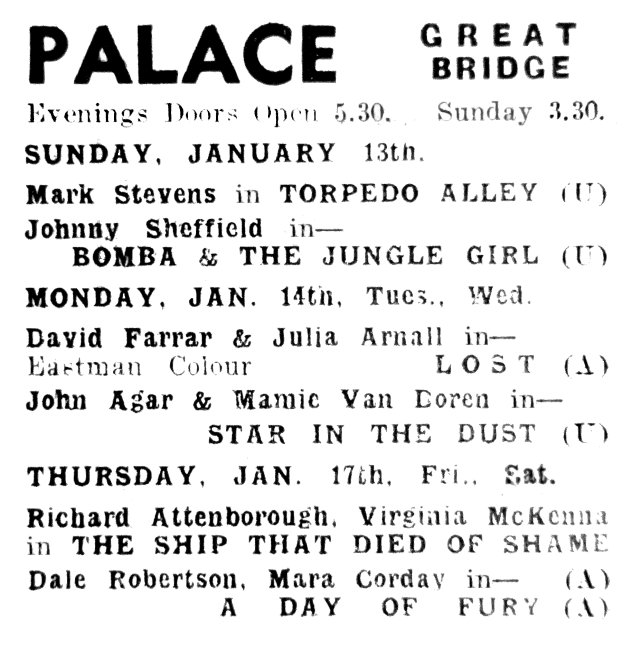
From the Tipton
Herald newspaper, January 1957. |
The Picture
House
Princes End once had a cinema
in a location that seems strange today. It was in
New Hall Street, off Bloomfield Road, roughly
halfway between Bloomfield Road and Foundry Street,
where modern houses now stand. It was called 'The
Picture House' and was built in an old disused
chapel. The cinema opened on the 18th November 1912
and was owned by Mr. B. T. Parsons. By the First
World War, Joseph Pearson had acquired the site. An
audience of 500 could be squeezed into the small
hall, which became known as the 'Brew-House'. The
seating was later improved and the hall could then
accommodate 350 people.
Sadly the venture was
unsuccessful and Joseph Pearson was declared
bankrupt. Undaunted, Mr. and Mrs. Jones acquired the
cinema and turned the business around. They even
leased the building on Sundays to the Rev. John
Young, Minister of New Hall Street Baptist Church,
for talks and slide shows after evening service. BTH
Sound equipment was installed and the cinema
continued to be well attended. It was then purchased
by Mr. MacDonald, who ran the cinema with his
family.
At the beginning of 1948 it
became the 'The Bruce'. Central heating was
installed and the interior again redecorated. The
cinema became very popular and was sold to Mr. and
Mrs. Woodroffe in 1953, who again refurbished the
interior. A bright future seemed certain, but the
council refused to renew the license. On the 31st
May, 1962, an arson attack in the house next door
resulted in some damage to the cinema which was soon
afterwards compulsorily purchased by the Council. |
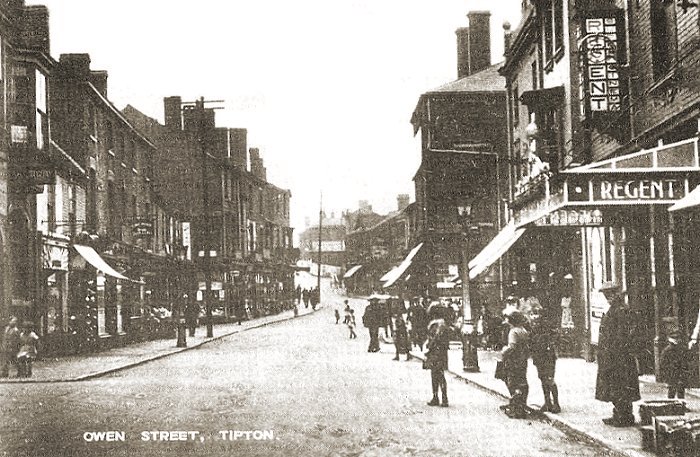
The Regent Cinema, from an old postcard.
|
The Tivoli
'The Tivoli' was an old market hall
in Owen Street. On the 30th May, 1910, planning
permission was granted for its conversion into a cinema.
It was founded by Benjamin Kennedy who obtained a cinema
license on the 27th July, 1910 and opened for business
soon afterwards. The venture was a great success, both
for films and variety performances. On the 31st January,
1916, when bombs were dropped on Tipton from a passing
Zeppelin, it was recorded that 'The Tivoli' was packed
to capacity.
By 1920 'The Tivoli' had been
acquired by Midland Entertainments, who closed the
building at the beginning of January of that year and improved
the facilities. The building was extended, 1,500 tip-up
seats were fitted, a new frontage was built, and the
cinema reopened on Monday the 16th August, 1920 as 'The
Regent'. It was officially opened by Councillor W. W.
Doughty, Chairman of Tipton Urban District Council. The
first film was 'The Gentlemen Riders' supported by 'The
Spiral of Death'.
From about 1924, Lancashire born,
Edgar Duckworth became proprietor. He had Western
Electric sound equipment installed in 1930 and soon
afterwards the premises was leased to Associated British
Cinemas, which had been formed in 1927. Success
continued and it became Tipton’s premier cinema. During
the Second World War it was operated by a company from
Manchester and later taken over again by Edward
Duckworth and his son David.
Ross projectors and an RCA sound
system were installed in 1948 and on the 28th June 1954
it became 'The New Regal Cinema'. It finally closed on
Saturday the 3rd December, 1960. The last film was 'Jazz
Boat', starring Anthony Newley, supported by 'Kill Her
Gently'. The building was emptied and for
many years was vandalised until demolition took place.
|
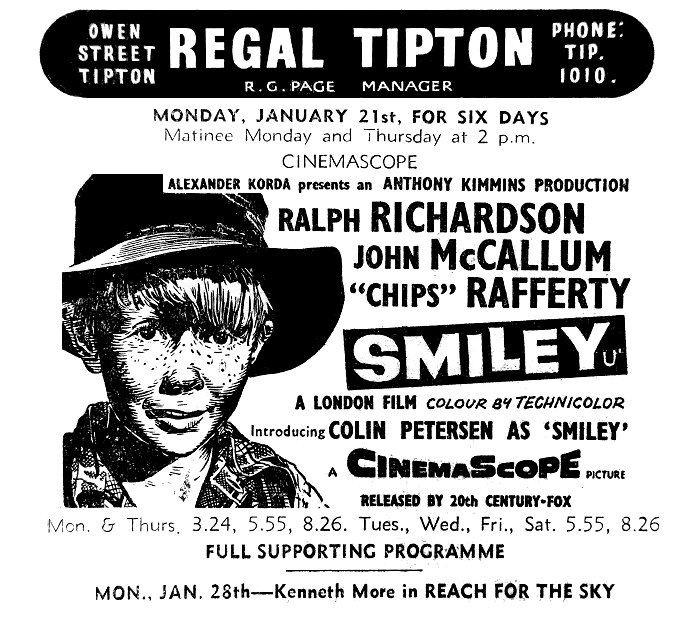
From the Tipton Herald
newspaper, January 1957. |
|
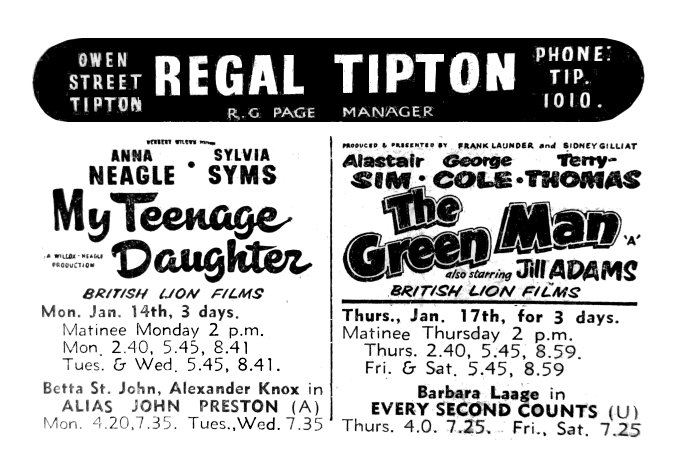
From the Tipton Herald
newspaper, January 1957. |
|
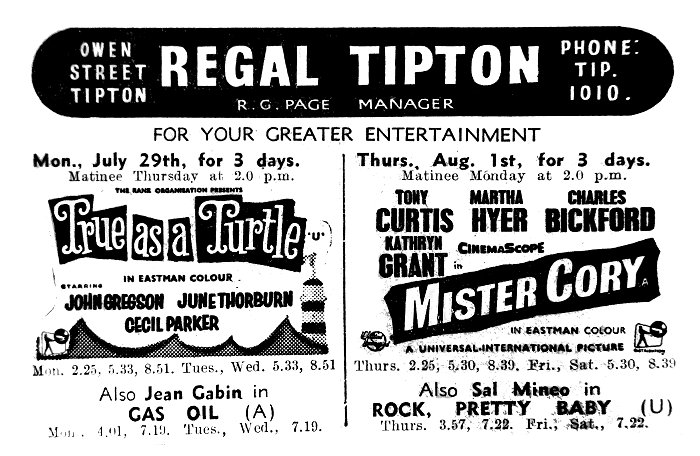
From the Tipton
Herald newspaper, July 1957. |
The Victoria Palace
There was a cinema in Railway
Street, Horseley Heath, where a row of modern houses now
stands. The cinema, called 'The Victoria Palace' was housed in
an old Primitive Methodist Chapel that had been empty
for some time. It had been built in 1859 at a cost of
£707 and could seat 380 people. In reality there were
few worshippers, often amounting to fewer than 30
people. There was also a Sunday School held there that
regularly had up to 200 students and 25 teachers. Around
1910 the Methodists decided to move to a much smaller,
more modern building and so the original building was
surplus to requirements.
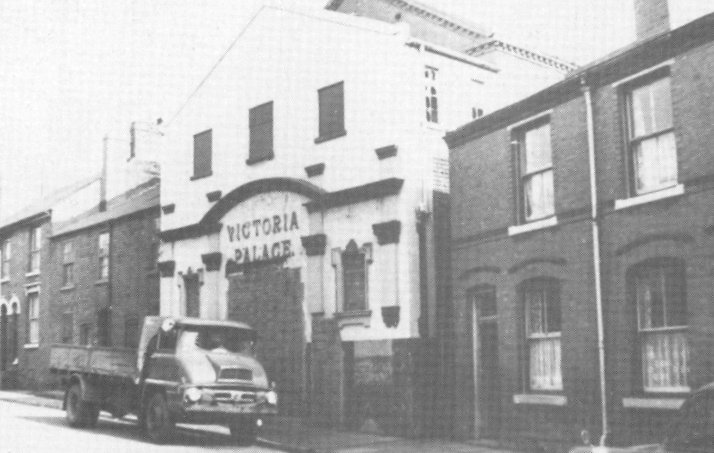
It was acquired by local politician
and hinge manufacturer, William Woolley Doughty, J.P., who lived nearby in
Horseley Heath Villa. The Victoria Palace Cinema opened
in the middle of 1912. William Woolley Doughty liked to give away Union Jack
badges between the films, and during times of depression
would provide the audience with tea and biscuits, and
even throw handfuls of pennies into the street. The
early silent films were accompanied by a woman playing
the piano, while William Doughty looked-on wearing a red
waistcoat and smoking a big cigar. He was a strict
disciplinarian who wouldn't tolerate bad behaviour.
After his death, his estate,
including 'The Victoria Palace' was left to his housekeeper
Mrs. Smith. A Mr. Evans became cinema manager and Jimmy
Jones played the piano. In 1932 it was sold to Mr. W. A. Webb, who
refurbished the building, installed a Classitone Sound
System and new seats, along with the first
plaster of paris screen in the country. The screen had
to be white-washed daily, a task given to the second
projectionist, Bill Wassell, who also had to clean the
intricate chandelier, once a month. The refurbished
cinema opened on the 26th December, 1932, seating 300
people. Mr. Goldstein from Birmingham later became
manager. In the early 1940s
it was acquired by Fred Leatham, who carried out many
improvements after the war, including an extension at
the rear, and an extension of the first floor at the
front. The floor level was raised and the seats were set
into concrete, which in later years caused the wooden
supports to rot and rows of seats to collapse. On the
balcony were five rows of seats and two boxes with draw
curtains. The cost of a box was nine pence. The building reopened on the 14th April, 1947
and was initially very successful with queues forming
outside, waiting for the doors to open. Sadly this
didn't continue, and so many 'X' certificate films were
shown in an attempt to attract customers. The attempt
failed and the cinema
closed in 1955 or 1956. In 1960
Horseley Bridge and Thomas Piggot Limited purchased the
building which became a wood store. In September 1968, Horseley merged with the John Thompson organisation at
Ettingshall. The building became derelict with the
closure of the Thompson Group and has since been
demolished and replaced by housing. |
 |
Return to
the
previous page |
|